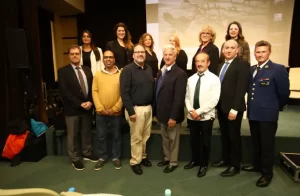COP’s Senior Fellow Paul Goldenberg travels to Dubai and Doha as part of the 2022 March of the Living commemoration
The Center on Policing’s Senior Fellow and Chief Policy Advisor Paul Goldenberg recently participated in the 2022 March of the Living commemoration, where he was able to visit Dubai and Doha, Qatar. During his trip, Paul was able to answer The Jerusalem Post’s questions about faith-based hate crimes and their causes for an article centered on antisemitism, shown below.
The growth of faith-based hate crimes – What are the causes? (The Jerusalem Post)
Two leading experts speak with The Jerusalem Post
by Alan Rosenbaum | Published: NOVEMBER 7, 2022

Karl Heeren (at front right) and victims of antisemitism at the 2022 March of the Living (photo credit: ALONI MOR)
The Jerusalem Post spoke with Paul Goldenberg, Senior Fellow and Chief Policy Advisor for the Rutgers University Center on Policing and the Miller Center for Community Protection and Resilience, and Commissioner Karl Heeren, Chief External and International Relations for the Antwerp Police in Belgium, two experts in the field, to gain a greater understanding and perspective of this serious phenomenon. Miller and Heeren will be speaking in Dubai on November 9 at a first-of-its-kind commemoration, marking the 84th anniversary of Kristallnacht, organized by the International March of the Living in partnership with the Crossroads of Civilizations Museum founded by Ahmed Obaid AlManssori.
“In the past 20-25 years, faith-based hate crime has morphed from vandalism, cemetery desecration, and graffiti on synagogue walls in the US and Europe,” says Goldenberg, “to organized, professional, well-planned terrorist attacks against Jewish communities and other vulnerable communities.”

Paul Goldenberg, Senior Fellow and Chief Policy Advisor for the Rutgers University Center on Policing and the Miller Center for Community Protection and Resilience (Credit: Miller Center)
Prior to the advent of social media, he explains, hate crimes were, for the most part, expressed by acts of vandalism and destruction of property. The advent of social media enabled like-minded people bent on violence to communicate with each other easily, thus facilitating severe acts of violence. “There is now a worldwide process,” he says, “that provides like-minded people with the capacity to mass communicate, share manifestos, and instigate attacks. We have gone from ‘flash’ to ‘bang’ in a matter of days, something which, before social media, used to take years. It has been accelerated by the internet.”
Recalling his five-period stint heading the hate crimes initiative for the Organization for Security and Co-operation in Europe (OSCE), Goldenberg mentions his surprise at that time, seeing Jewish institutions in Europe surrounded by protective battalions of special police and military units. “I came back to the United States and was head of homeland security for the American Jewish Community. I said that we could never get to that place, and lo and behold, seven or eight years later, we got to a worse place, with acts of violence that, in some cases, overshadowed what was happening in Europe.”
Goldenberg adds that while other ethnic groups have been subject to hate crimes, the Jewish community has suffered more than most. “There is no doubt that violent attacks, threats and vandalism against the Jewish community here and abroad hold the greatest number within the database. The Jewish community has suffered greatly at the hands of extremists both from the right and from the left.” In 2021, the Anti-Defamation League tabulated 2,717 antisemitic incidents throughout the United States, a 34% increase from the 2,026 incidents recorded in 2020 and the highest number on record since ADL began tracking antisemitic incidents in 1979.
Heeren, who has worked together with Goldenberg through the Miller Center, says that the Antwerp Jewish community, with more than one hundred Jewish institutions situated within a very small area in the center of the city, is an inviting target for terror attacks. “As a port city,” he notes, “we have 178 different nationalities. For centuries, the Jewish community has been important for economic life in Antwerp.”
Terror attacks against Jews in Antwerp began in the 1980s. In July 1980, a Syrian-born Palestinian threw grenades at a group of 40 Jewish schoolchildren, killing one and wounding twenty. In October 1981, a truck bomb exploded outside a Portuguese synagogue in Antwerp on Simchat Torah, killing three and injuring over 100 people.
“Eighteen years ago,” says Heeren, “we were looking for partners with more experience – not only from the point of view of law enforcement but with the skills to reach out to the Jewish community and different ethnic groups. Outreach programs have been very important for us, and
we didn’t have as much experience as we do now. Thanks to Paul and the agency he has worked with, we learned a lot, and we modified our police organizations into a modern one where we could reach out in a professional way to all the groups here in Antwerp.”
Given the proliferation of hate speech and preparation for hate crimes via the internet, Heeren says that the Antwerp police department has invested a great deal of its resources utilizing experts in information technology (IT) to patrol the web and prevent attacks. “Working proactively means scanning the internet and finding the evidence you need to build the case and not waiting for a terrorist attack.”
Goldenberg adds that it is important to train the citizenry to be proactive in their own areas of safety and security. “The majority of our work at the Miller Center and with police departments such as Antwerp’s is in training citizenry. We have taken the “If You See Something, Say Something” campaign in the United States and put it out in Hebrew and Yiddish.” When Goldenberg headed the Secure Community Network (SCN), the Jewish homeland security information sharing initiative, he focused on “training, training, and more training,” instructing synagogue and community center personnel to be on the lookout and aware. “It has paid dividends,” he says. In Chicago, the Miller Center will soon be providing the first mass communication center between all faith-based groups and the police department.
Further afield, Goldenberg says that the Miller Center has been working in Sweden for the past three years with street gangs, youth facilities and the Swedish police. “Our work has expanded tremendously – not just in the Jewish community, but to vulnerable communities across the spectrum.”
Heeren notes that police officers in Antwerp are trained to learn the mindset and customs of the Jewish community. “Training and education to understand Jewish customs is very important. Police officers don’t necessarily live in Antwerp, and they are familiar with the community only because of their profession.” All Antwerp police officers receive training and instruction about discrimination and hate crimes. “Education and training are very important,” he adds.
“We are proud of what we have worked on in Antwerp for the past ten years,” says Goldenberg. “What Karl is doing there is the model for all of Europe.” Until a decade ago, he explains, there was little communication between Jewish communities and the police. The open exchange of information and communication between the Jewish community of Antwerp and its police department has become the model.
Heeren participated in last year’s March of the Living through the invitation of the Miller Center. It was not only significant from a personal point of view – his grandfather died in one of the camps – but it was important from a professional perspective as well. “As a police officer working in Antwerp for close to thirty years, talking with Jewish citizens, you need to understand what people have been through to understand them. By experiencing the March of the Living, do understand the feelings they have, the burden they carry and experience, and the loss and trauma they experienced. I think that every police officer from Antwerp or from a police department with a Jewish community should participate in the March of the Living.”
He added that “Let there be Light,” the March of the Living’s global campaign against antisemitism, racism, hatred and intolerance, which began in 2020, is also significant and is part of “an ongoing process of education, showing respect for what happened in the past, and building bridges for the future.”
Ultimately, says Paul Goldenberg, what distinguishes the Miller Center from other organizations is the fact that they are on the ground when conflicts occur to facilitate cooperation, communication and education between police and members of different communities. “We look at problems and address those that are specific to communities, rather than just give a blanket solution to a very specific problem.”
Professor David Machlis of Adelphi University and co-founder of the International March of the Living underscored the importance of the Miller Center’s activities: “We are very proud and honored to consider the Miller Center for Community Protection and Resilience at Rutgers University our long-standing partner in combating intolerance, racism, antisemitism and all forms of hatred globally. The Miller Center’s seminal research on hate crimes on the internet and their tireless efforts to protect faith-based communities from attacks that seem to be growing exponentially is both admirable and perfectly aligned with the universal goals of the March of the Living.”
This year, marking 84 years since the Kristallnacht pogrom, the International March of the Living together with its partners – the Neishlos Foundation, the Crossroads of Civilizations Museum at the UAE, the Combat Antisemitism Movement (CAM), META, the Austrian Jewish community, and the Miller Center for Community Protection and Resilience at Rutgers University, will hold commemorative events in Jerusalem, Vienna and Dubai. The event in Dubai will be the first event of its kind held in the Arab and Islamic world.
The event in Dubai will take place at the Crossroads of Civilizations Museum, founded by H.E. Ahmed Obaid AlMansoori, and will stand as the inaugural event of the new March of the Living Chapter in the Gulf, headed by MOTL Ambassador in the Gulf, Eitan Neishlos.
